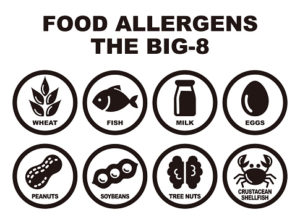The Top Food Allergies

Many adults and children have a food allergy that significantly impacts their quality of life. A food allergy is a condition where an exposure to a certain food or food allergen will cause a harmful immune response. The immune response is called an allergic reaction. Symptoms of the allergic food reaction can range from mild to severe symptoms and appear within minutes to 2 hours after ingestion of the food. Mild symptoms include minor itching, hives, or skin rashes. Severe reactions involve coughing, wheezing, tightening of the throat and/or difficulty breathing. Mild symptoms can easily become severe if not addressed promptly. The most severe life-threatening allergic reaction is known as an anaphylaxis reaction that can have a sudden onset and cause death.
The Food Allergen Labeling and Consumer Protection Act
There are more than 170 foods that can cause allergic reactions in people with food allergies. However, there are eight most common food allergens that cause allergic reactions. These eight food allergens account for 90% of food allergies. The eight major food allergens are required by the Food Allergen Labeling and Consumer Protection Act of 2004 to be clearly identified on food labels. The act requires that food labels identify food source names of all the major food allergens used in preparing the food. This enables people with food allergies to easily identify offending foods or ingredients to avoid them by reading the food labels.
Eight Major Food Allergens
The eight most common foods or food allergens that cause allergic reactions are:
- Milk
- Eggs
- Fish
- Crustacean Shellfish
- Tree nuts
- Peanuts
- Wheat
- Soybeans
Treatment for Food Allergies
There is currently no cure for food allergies. Sometimes children may outgrow their food allergies, but not always. The best way to manage food allergies is to avoid the food allergens with early recognition. However, in minor food allergies treatment with over-the-counter antihistamines, such as Benadryl, may help lessen the symptoms. In severe food allergic reactions like anaphylaxis, prompt treatment with epinephrine may help prevent serious consequences and death.
If you have any questions about different food allergies, contact Allergy, Asthma, and Immunology Medical Group at 805-658-9500 to work directly with our doctors. Though it may not be possible to cure your food allergy, there are steps that can be taken to significantly reduce the impact it has on your life. Don’t wait, reach out to us today!



